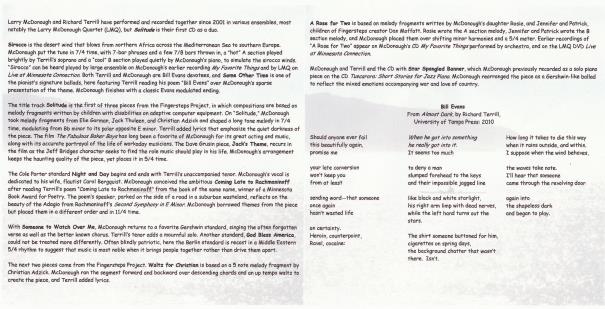“Sirocco” is the desert wind that blows from northern Africa across the Mediterranean Sea to southern Europe. McDonough put the tune in 7/4 time, with 7-bar phrases and a few 7/8 bars thrown in, a “hot” A section played brightly by Terrill’s soprano and a “cool” B section played quietly by McDonough’s piano, to simulate the sirocco winds. “Sirocco” can be heard played by large ensemble on McDonough’s earlier recording “My Favorite Things” and by LMQ on “Live at Minnesota Connection”.
Both Terrill and McDonough are Bill Evans devotees, and “Some Other Time” is one of the pianist’s signature ballads, here featuring Terrill reading his poem “Bill Evans” over McDonough’s sparse presentation of the theme. McDonough finishes with a classic Evans modulated ending.
The title track “Solitude” is the first of three pieces from the SpecAbilities Project, in which compositions are based on melody fragments written by children with disabilities on adaptive computer equipment. On “Solitude,” McDonough took melody fragments from Elie Gorman, Jack Thuleen, and Christian Adzick and shaped a long tone melody in 7/4 time, modulating from Bb minor to its polar opposite E minor. Terrill added lyrics that emphasize the quiet darkness of the piece.
The film “The Fabulous Baker Boys” has long been a favorite of McDonough for its great acting and music, along with its accurate portrayal of the life of workaday musicians. The Dave Grusin piece, “Jack’s Theme”, recurs in the film as the Jeff Bridges character seeks to find the role music should play in his life. McDonough’s arrangement keeps the haunting quality of the piece, yet places it in 5/4 time.
The Cole Porter standard “Night and Day” begins and ends with Terrill’s unaccompanied tenor. McDonough’s vocal is dedicated to his wife, flautist Carol Bergquist.
McDonough conceived the ambitious “Coming Late to Rachmaninoff” after reading Terrill’s poem “Coming Late to Rachmaninoff” from the book of the same name, winner of a Minnesota Book Award for Poetry. The poem’s speaker, parked on the side of a road in a suburban wasteland, reflects on the beauty of the Adagio from Rachmaninoff’s “Second Symphony in E Minor”. McDonough borrowed themes from the piece but placed them in a different order and in 11/4 time.
With “Someone to Watch Over Me”, McDonough returns to a favorite Gershwin standard, singing the often forgotten verse as well as the better known chorus. Terrill’s tenor adds a mournful solo. Another standard, “God Bless America”, could not be treated more differently. Often blindly patriotic, here the Berlin standard is recast in a Middle Eastern 5/4 rhythm to suggest that music is most noble when it brings people together rather than drive them apart.
The next two pieces come from the SpecAbilities Project. “Waltz for Christian” is based on a 5 note melody fragment by Christian Adzick. McDonough ran the segment forward and backward over descending chords and an up tempo waltz to create the piece, and Terrill added lyrics. “A Rose for Two” is based on melody fragments written by McDonough’s daughter Rosie, and Jennifer and Patrick Moffatt. Rosie wrote the A section melody, Jennifer and Patrick wrote the B section melody, and McDonough placed them over shifting minor harmonies and a 5/4 meter. Earlier recordings of “A Rose for Two” appear on McDonough’s CD “My Favorite Things” performed by orchestra, and on the LMQ DVD “Live at Minnesota Connection”.
McDonough and Terrill end the CD with “Star Spangled Banner”, which McDonough previously recorded as a solo piano piece on the CD “Tuscarora: Short Stories for Jazz Piano”. McDonough rearranged the piece as a Gershwin-like ballad to reflect the mixed emotions accompanying war and love of country.
“Bill Evans”, From “Almost Dark”, by Richard Terrill, University of Tampa Press: 2010
Should anyone ever fail
this beautifully again,
promise me
your late conversion
won’t keep you
from at least
sending word--that someone
once again
hasn’t wasted life
on certainty.
Heroin, counterpoint,
Ravel, cocaine:
When he got into something
he really got into it.
It seems too much
to deny a man
slumped forehead to the keys
and their impossible jagged line
like black and white starlight,
his right arm limp with dead nerves,
while the left hand turns out the stars.
The shirt someone buttoned for him,
cigarettes on spring days,
the background chatter that wasn’t there. Isn’t.
How long it takes to die this way
when it rains outside, and within.
I suppose when the wind behaves,
the waves take note.
I’ll hear that someone
came through the revolving door
again into
the shapeless dark
and began to play.

